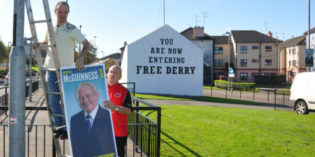Building sub-national government

Who’s going to hold the new metro mayors to account?
Six English mayors will be elected on 4 May. They will enjoy extensive new powers. But who will hold them to account? Unlike in London, no directly-elected assembly will scrutinise the mayors’ action. Chris Terry warns that councillors need to step up to the role – and the method of electing councils themselves makes this deeply problematic. A […]

‘Mum-of-two, 40’: but women rise to the top in Northern Irish politics
Women now lead three of the five main parties in Northern Ireland and make up 30% of the Assembly. Danielle Roberts looks at the sea-change in women’s participation in Northern Irish politics since the Good Friday Agreement, which has happened in spite of the lack of Unionist female politicians. While a number of BME and LGBT […]

Hidden dragon: why is Wales ignored in London and inadequately reported at home?
A healthy democracy needs mechanisms that enable citizens to understand the political process and engage in the functioning of politics. But achieving such an understanding is proving a major problem for Wales. Craig Johnson reflects on the broader problems caused by the inadequate reporting of Welsh politics – not just in the country itself, but […]

Going local – but does decentralisation actually make for more innovative policy?
The mayoral elections in May are part of a plan put in place by George Osborne to reinvigorate local government in the UK. “The old model of trying to run everything in our country from the centre of London is broken,” he said in 2015. But does decentralisation make government more innovative – and if […]

After the 2 March election, the Northern Ireland settlement needs a rethink
The Northern Ireland Assembly election on 2 March is likely to be followed by a difficult political negotiation. Alan Whysall argues that it must not be mere political sticking plaster. There is no real alternative to the basic architecture of the institutions, but there are fundamental issues to be dealt with about the way they […]

The ‘academy revolution’ is ousting governors. We need to hold these schools accountable
As more and more schools are removed from local authority control and become academies, the role of governors has diminished – and with it a school’s accountability to local people, argues Andy Allen. Contrary to the aim of the ‘school revolution’, multi-academy trusts are not autonomous at all, but answerable to a few unelected trustees. He […]

What’s going wrong with English Votes for English Laws – and how can it be improved?
The ‘English Votes for English Laws’ procedural rules have attracted much criticism since they came into use a year ago – variously described as complex, divisive and not making England’s voice heard. Daniel Gover and Michael Kenny look at how EVEL is working, and how it could be improved. Similar Posts‘English Votes for English Laws’ —a viable answer to the […]

Book review | Locating Localism: Statecraft, Citizenship and Democracy, by Jane Wills
In Locating Localism: Statecraft, Citizenship and Democracy, Jane Wills explores the development of localism in the UK and the structures that both encourage and impede the transfer of decision-making to the neighbourhood level. While the book occasionally lacks engagement with the precise relationship between devolution and localism and the political struggles occurring within communities, Richard […]

The quality of mercy: how religion and ethno-nationalism influence attitudes towards amnesty in Northern Ireland
The Good Friday Agreement gave political resonance to concepts like amnesty, forgiveness and mercy – all of them familiar from the lexicon of religion. John D Brewer and Bernadette C Hayes found that religious and ethno-national identity in Northern Ireland both influence public attitudes towards amnesty. In particular, belief in the Bible as the literal word of […]

Why do some local authorities have such poor websites? Insights from Sweden
Some Swedish local authorities have embraced online services and forms of digital democracy. Others have been slow to take up the opportunity. Gustav Lidén rates the country’s 290 municipalities according to the depth of their digital engagement, and looks at the possible factors influencing it. Lack of enthusiasm from senior politicians and bureaucratic inertia are key […]


 Democratic Audit's core funding is provided by the Joseph Rowntree Charitable Trust. Additional funding is provided by the London School of Economics.
Democratic Audit's core funding is provided by the Joseph Rowntree Charitable Trust. Additional funding is provided by the London School of Economics.